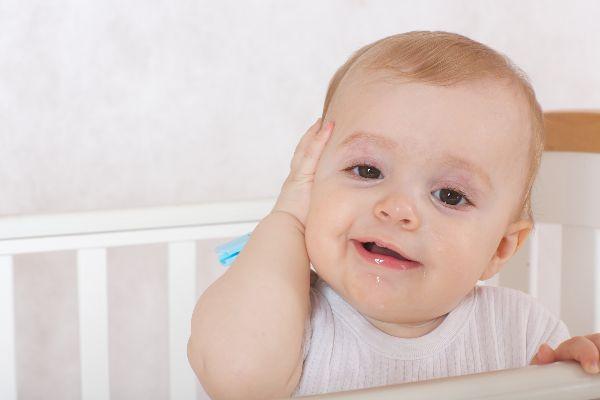Teething usually starts at around six months or so 1.1, when your baby’s first teeth begin to push up (although it’s important to note that all children are different, so there aren’t exactly any hard and fast rules).
In fact, some babies fly through teething, without any – or many – of the unpleasant symptoms associated with this stage.
However, there are some general signs that can indicate your baby is teething. To help you spot it, here are eight of the most common:
1. Drooling
All babies drool, beginning at about three months and lasting until around 15 months or so – but drooling can increase when a baby’s teeth are pushing up. This doesn’t necessarily have anything to do with teething, however; it generally means your baby is creating saliva, which is normal for this stage. To determine if your child’s drooling may be teething-related, look to the other symptoms they’re going through too.
2. Rash
Teething babies commonly develop a rash around the chin and mouth, known as ‘drool rash’. This rash generally is red and splotchy and should clear up with a homecare regimen of fragrance-free baby wash and moisturiser.
3. Irritability
At its most simple, teething can be sore! Baby’s new teeth are pushing up through their little gums for the first time, so it stands to reason there can be pain and discomfort. If your baby is crankier and more irritable than usual, it’s a sign they may have started teething.
4. Tender, swollen gums
Tender, swollen gums are common during teething, and usually come about when a tooth is about to push up. However, the gums shouldn’t be blue, or have any red sores. Check your baby’s gums regularly for any changes and if you have any concerns, visit your doctor or dentist immediately
5. Fever
Teething doesn’t cause a fever per se, but the symptoms associated with it – like sore, swollen gums – can bring on a mild raise in temperature. Bear in mind, if your child has a high fever, it’s possible it could actually be due to an infection like an earache, cold or flu. Keep a close eye out for other symptoms, and if your child runs a fever over 37.5°C, seek medical help.
6. Disrupted sleep
Teething can cause pain and irritability in the night-time as well as the day, so it’s quite common for teething babies to have trouble sleeping. As well as this, the aforementioned rise in temperature can also keep a teething child from their slumber.
7. Biting and chewing on EVERYTHING
One of the most telling signs your baby is teething is if they seem compelled to bite, chew and suck everything in sight. That’s why teething rings are so popular – they offer a resistance babies can bite and chew against, easing the soreness of their gums with the counter pressure.
8. Grabbing their ears
It’s normal for teething babies to grab at their ears, usually on the side of the face the tooth is erupting from. However, it may be due to a number of reasons, like too much wax in the ear or even an ear infection. If they’re pulling at their ear and they have a fever, it’s very possible they may have an ear infection – if this is the case it’s advised you make an appointment to see your doctor.









